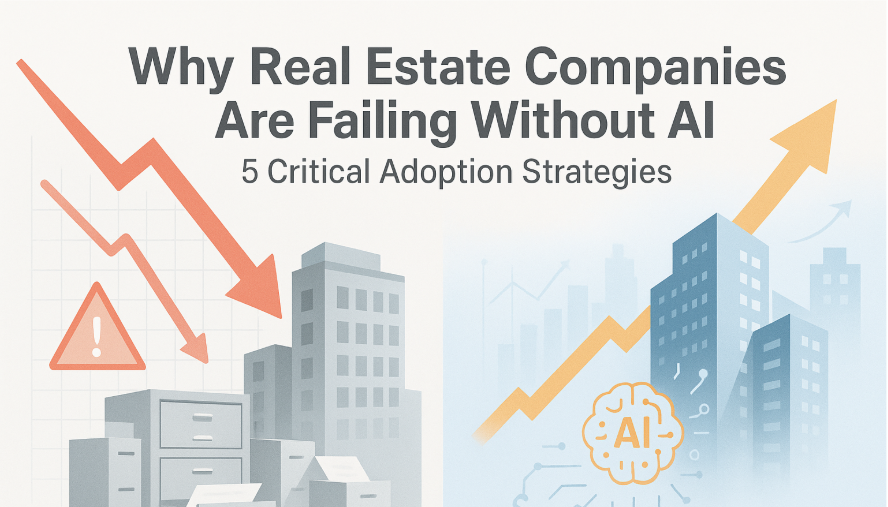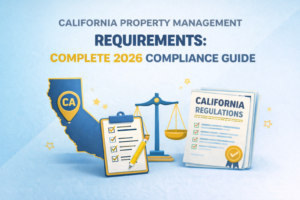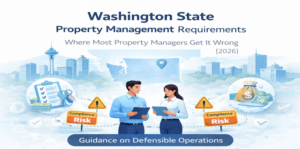
What is AI in Real Estate?
AI in real estate refers to artificial intelligence technologies that automate property management, help you make informed decisions, and keep operations running smoothly across the real estate value chain. Currently, 36% of respondents globally report using AI in their organizations, marking a dramatic acceleration from previous years.
Key Statistics: AI in Real Estate 2025
- Market Growth: The AI real estate market grew from USD 2.9 billion in 2024 to a projected USD 41.5 billion by 2033 – representing explosive 14x growth over nine years.
- Adoption Rates: By 2030, about 90% of real estate agencies are expected to use AI, up from the current 36% adoption rate globally.
- Revenue Impact: 63% of property companies and 53% of facility managers using AI reported a revenue increase following AI implementation.
- Value Creation: According to McKinsey, AI in real estate is projected to add over $180 billion in value to the US real estate market annually.
- Efficiency Gains: AI is set to drive 38% of efficiency savings in real estate by 2030 and generate over $40 billion annually for the global commercial sector by 2025.
How Much ROI Does AI in Real Estate Provide?
- Revenue Increases: 63% of property companies using AI reported revenue increases
- Facility Management: Facility managers noted a 10% revenue increase due to AI – though note: McKinsey reports hotels leveraging AI see 17% increase in revenue and 10% boost in occupancy
- Property Operations: Companies report 15.8% maintenance cost reduction and 14% overall property cost savings
- Lead Generation: 33% improvement in lead generation quality, with smart survey integration boosting results to 138%
- Administrative Costs: Morgan Stanley Research shows AI can automate 37% of real estate tasks, delivering $34 billion in efficiency gains by 2030
Executive Summary: The Real Estate AI Revolution
The real estate industry stands at a transformation inflection point. Currently, 36% of respondents globally report using AI in their organizations, while McKinsey projects AI will add over $180 billion in value to the US real estate market annually. This represents the most significant technological shift in real estate since the Internet.
The Competitive Reality: Companies implementing AI in real estate solutions report 63% revenue increases, while traditional firms face 15-30% operational efficiency losses and cost structures that are 30-fold higher in critical areas. The message is unambiguous: AI adoption is no longer about competitive advantage, it’s about survival.
Market Trajectory: The AI real estate market exploded from USD 2.9 billion in 2024 to a projected USD 41.5 billion by 2033, representing 14x growth driven by expectations that 90% of real estate agencies will use AI by 2030.

Market Reality: The Great Real Estate Divide
Current State of AI in Real Estate Adoption
75% of America’s leading real estate brokerages already use AI technology, with almost 80% reporting their agents have adopted AI tools. However, this creates a stark divide between leading firms and traditional companies struggling with outdated processes.
The Adoption Gap: Only 14% of real estate firms used artificial intelligence, according to a 2023 survey among 750 CFOs at major companies worldwide, creating massive competitive disparities between early adopters and laggards.
Agent Usage Patterns: Real estate agents employ AI primarily to craft property descriptions (82%), followed by generating blog posts, emails, and letters (67%), social media content (60%), website content (44%), and writing personal bios (43%).
Success Stories vs. Traditional Failures
Breakthrough Implementations:
- Bob Knakal’s BKREA: Leverages AI-powered market analysis to maintain a $2 billion sales pipeline with just 15 team members, productivity levels impossible with traditional methods
- Barry Plant’s “Grace” Chatbot: Revolutionized customer engagement, handling 80% of initial inquiries automatically while improving response times by 95% and increasing lead conversion rates by 34%
- Redfin’s AI Engine: Generates 4x higher click-through rates through machine learning algorithms analyzing over 500 data points per property
Market Transformation Timeline
The generative AI market in real estate grew from USD 351.9 million in 2022 to a projected USD 1,047 million by 2032, with a CAGR of 11.52%. This acceleration creates unprecedented competitive pressure where traditional firms risk rapid displacement.
Future Projections: Executives rate AI’s current importance to the industry at 5 out of 10, which surges by 40% when asked about AI’s importance in the “near future”, indicating massive transformation ahead.
The Five Critical AI in Real Estate Adoption Strategies
Strategy 1: Intelligent Lead Management & Tenant Matching
Question: How does AI improve real estate lead generation?
AI-powered lead management transforms traditional qualification processes from 23% accuracy to 85% accuracy in identifying high-value prospects. AI in real estate lead systems analyze behavioral patterns, demographic data, and interaction history to deliver unprecedented conversion rates.
Core Components:
- Predictive lead scoring using machine learning algorithms
- Automated tenant matching based on 500+ property attributes and preferences
- 24/7 chatbot systems handling initial inquiries and qualification
- Dynamic pricing optimization based on real-time demand patterns
Proven Results:
- Lead Generation: 33% improvement in lead generation quality
- Smart Surveys: 138% boost when integrated with AI-powered questionnaires
- Screening Efficiency: 75% reduction in tenant screening time (3-5 days reduced to 2-4 hours)
- Engagement Rates: Redfin’s AI recommendations generate 4x higher click-through rates
Strategy 2: Automated Property Operations & Maintenance
Question: What ROI does AI provide for property maintenance?
Predictive maintenance represents the highest-impact AI in real estate application, delivering immediate cost reductions and operational improvements. IoT sensors combined with machine learning algorithms predict equipment failures up to 6 months in advance.
Technology Framework:
- Predictive maintenance algorithms analyzing equipment performance data
- IoT integration for real-time building system monitoring
- Smart building management optimizing energy consumption
- Automated work order generation and vendor assignment
Quantified Impact:
- Cost Reduction: 15.8% maintenance cost reduction and 14% overall property operating cost savings
- Failure Prevention: 70% reduction in equipment failure rates
- Inspection Efficiency: 30-fold improvement (4-6 hours reduced to 8-12 minutes)
- Accuracy: 95% accuracy in identifying potential maintenance issues
- Per Square Foot Savings: $2.50-$4.00 annually through AI-driven maintenance
Strategy 3: Financial Process Automation
Question: How much can AI reduce real estate administrative costs?
AI in real estate financial automation achieves 98% collection rates compared to 87% for traditional methods while reducing administrative costs by 40%. Automated systems transform time-intensive processes into efficient, accurate operations.
Automation Components:
- Intelligent rent collection with automated follow-up sequences
- Dynamic expense allocation across multiple properties and entities
- ERP integration for seamless financial data flow
- Compliance automation for regulatory reporting requirements
ROI Metrics:
- Administrative Cost Reduction: 40% decrease in administrative expenses
- Project Completion: 25% faster completion times
- Collection Rates: 98% vs. 87% traditional success rates
- Reporting Efficiency: Monthly reports generated in 15 minutes vs. 8-12 hours manually
- Break-even Timeline: 6-8 months typical payback period
Strategy 4: Data-Driven Decision Making
Question: How accurate is AI for real estate property valuation?
AI-powered property valuation achieves 95% accuracy compared to 73% for traditional appraisal methods while processing valuations in minutes rather than days. This transformation enables real-time decision-making and improved portfolio performance.
Analytics Infrastructure:
- Automated property valuations using machine learning models
- Portfolio performance analytics with predictive modeling
- Market intelligence systems tracking trends and opportunities
- Investment scenario modeling for strategic planning
Decision Impact:
- Valuation Accuracy: 95% vs. 73% traditional methods
- Processing Speed: Minutes vs. days for comprehensive valuations
- Portfolio Performance: 18-25% annual improvement through data-driven decisions
- Market Analysis: Real-time trend identification and opportunity recognition
Strategy 5: Unified Platform Integration
Question: What ROI do unified real estate platforms provide?
Unified platform architectures eliminate data silos and enable smooth AI implementation. Companies using integrated platforms report 90% reduction in outsourced work and 318% ROI from unified entity management systems.
Integration Advantages:
- Centralized data management across all properties and entities
- Seamless third-party application connectivity through API-first architecture
- Scalable cloud infrastructure supporting business growth
- Real-time synchronization across all system components
Propertese: Essential Infrastructure for AI Success
While the industry races toward AI in real estate implementation, successful transformation requires robust operational foundations. Propertese provides the essential infrastructure through comprehensive automation and centralized management that enables companies to build upon solid operational frameworks.
The Unified Platform Foundation
Question: What infrastructure do real estate companies need for AI success?
Propertese’s unified platform architecture solves the fundamental challenge preventing successful AI in real estate implementation: data silos and operational fragmentation. Centralized management within integrated systems eliminates inefficiencies that block AI algorithm effectiveness.
Centralized Data Management:
- Multi-subsidiary portfolio management with real-time synchronization
- Unified data flows essential for AI algorithm accuracy
- Comprehensive property, tenant, and financial data integration
- Real-time accessibility across multiple devices and locations
Automated Financial Operations:
- Comprehensive rent collection automation reduces administrative overhead by 40%
- Automated invoice generation and ERP system integration
- Real-time financial reporting and compliance tracking
- Detailed audit trails supporting regulatory requirements
Maintenance Automation Framework:
- Intelligent work order generation and vendor assignment
- Mobile integration for field teams and contractors
- Comprehensive maintenance history creation supporting predictive analytics
- Real-time status tracking and performance monitoring
Operational Excellence Through Automation
Propertese’s automation capabilities extend beyond task management to create operational excellence, supporting strategic growth and AI in real estate implementation readiness.

Competitive Advantages and Measurable ROI
The 318% ROI from unified entity management reflects Propertese’s ability to eliminate operational inefficiencies while creating capabilities supporting business growth and AI in real estate preparation.
Scalability Framework:
- Platform architecture growing with business needs seamlessly
- Support from single properties to large portfolios without system changes
- Flexible configuration supporting diverse business models
- Future-ready infrastructure for AI implementation
Integration Capabilities:
- Seamless connectivity with existing systems preserving current investments
- API-first architecture enabling third-party application integration
- Data migration support ensures smooth transitions
- Vendor-agnostic approach supporting best-of-breed solutions
Efficiency Optimization:
- Automation reducing manual tasks and administrative overhead significantly
- Management time liberation for strategic initiatives and business development
- Cost reduction through process optimization and error elimination
- Performance improvement through real-time monitoring and analytics
Market Trends and Future Outlook
AI in Real Estate Predictions for 2025-2026
- Adoption Acceleration: 90% of real estate agencies are expected to use AI by 2030, while 75% of brokerages already use the technology with almost 80% reporting agent adoption.
- Content Creation: 75% of brokerages are using AI for content creation, transforming marketing and communication processes across the industry.
- Value Creation Potential: McKinsey Global Institute believes that gen AI could generate $110 billion to $180 billion or more in value for the real estate industry.
- Market Growth: The generative AI market in real estate is projected to reach USD 1,047 million by 2032, driven by increasing tool adoption and capability expansion.
Competitive Landscape Transformation
- Digital Displacement: Traditional real estate firms face displacement by tech-native competitors using AI in real estate to deliver superior customer experiences at lower operational costs.
- Customer Expectations: 85% of prospective tenants and buyers expect instant, personalized service, creating pressure for immediate AI adoption.
- Operational Efficiency: Companies delivering faster, more accurate service while maintaining lower costs capture market share from traditional competitors struggling with outdated processes.
- Innovation Imperative: Leaders plan to leverage AI in digital marketing (73%) and social media (72%) as leading anticipated future uses.
Contact Propertese to discover how our unified platform creates the essential foundation for your AI transformation. Schedule your consultation now and join the 36% of forward-thinking real estate companies already leveraging technology for competitive advantage. Tomorrow’s market leaders are making this decision today.
FAQ: AI in Real Estate
Currently, 36% of respondents globally report using AI in their organizations, with 75% of America’s leading real estate brokerages already using AI technology.
According to McKinsey, AI in real estate is projected to add over $180 billion in value to the US real estate market annually.
By 2030, about 90% of real estate agencies are expected to use AI, representing massive industry transformation.
63% of property companies and 53% of facility managers using AI reported a revenue increase following AI implementation, with many companies achieving 300%+ ROI within the first year.
Real estate agents employ AI primarily to craft property descriptions (82%), followed by generating blog posts, emails, and letters (67%), social media content (60%), website content (44%), and writing personal bios (43%).
Table of Contents
Stay Updated
Subscribe to get the latest news, industry trends, blog posts, and updates...




